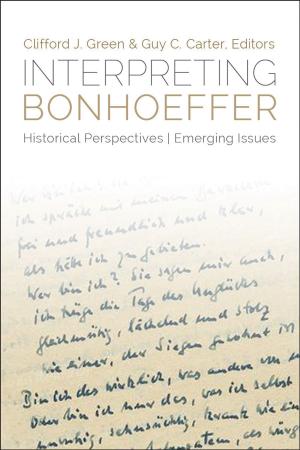The Interpreting Angel Motif in Prophetic and Apocalyptic Literature
Nonfiction, Religion & Spirituality, Judaism, History, Bible & Bible Studies, Study, Old Testament| Author: | David P. Melvin | ISBN: | 9781451469660 |
| Publisher: | Fortress Press | Publication: | August 1, 2013 |
| Imprint: | Fortress Press | Language: | English |
| Author: | David P. Melvin |
| ISBN: | 9781451469660 |
| Publisher: | Fortress Press |
| Publication: | August 1, 2013 |
| Imprint: | Fortress Press |
| Language: | English |
Melvin traces the emergence and development of the motif of angelic interpretation of visions from late prophetic literature (Ezekiel 40–48; Zechariah 1–6) into early apocalyptic literature (1 Enoch 17–36; 72–82; Daniel 7–8). Examining how the historical and socio-political context of exilic and post-exilic Judaism and the broader religious and cultural environment shaped Jewish angelology in general, Melvin concludes that the motif of the interpreting angel served a particular function. Building upon the work of Susan Niditch, Melvin concludes that the interpreting angel motif served a polemical function in repudiating divination as a means of predicting the future, while at the same time elevating the authority of the visionary revelation. The literary effect is to reimagine God as an imperial monarch who rules and communicates through intermediaries—a reimagination that profoundly influenced subsequent Jewish and Christian tradition.
Melvin traces the emergence and development of the motif of angelic interpretation of visions from late prophetic literature (Ezekiel 40–48; Zechariah 1–6) into early apocalyptic literature (1 Enoch 17–36; 72–82; Daniel 7–8). Examining how the historical and socio-political context of exilic and post-exilic Judaism and the broader religious and cultural environment shaped Jewish angelology in general, Melvin concludes that the motif of the interpreting angel served a particular function. Building upon the work of Susan Niditch, Melvin concludes that the interpreting angel motif served a polemical function in repudiating divination as a means of predicting the future, while at the same time elevating the authority of the visionary revelation. The literary effect is to reimagine God as an imperial monarch who rules and communicates through intermediaries—a reimagination that profoundly influenced subsequent Jewish and Christian tradition.















